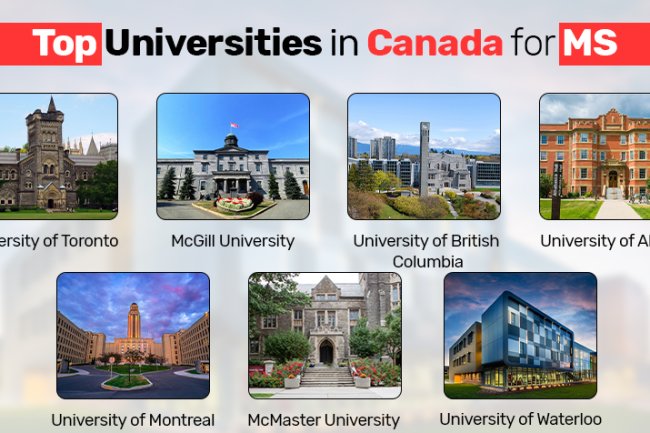Top Jobs After MBA In Canada
Looking to Jobs After MBA In Canada. Well there are several option where you can apply for Jobs After MBA In Canada. You will have a wide range of career opportunities available to you.

One of the most popular programmes globally, including in Canada, is the MBA. The employment chances following an MBA in Canada are what attract international students and act as a stepping stone to executive-level roles. SMEs, which employ more than 60% of the country's workforce and demand more than 150,000 professionals annually, dominate the job market in Canada.
The main hubs for jobs after an MBA in Canada are Toronto, Vancouver, and Montreal. For overseas students, we will examine stay-back alternatives, well-liked MBA specialisations, significant recruiters, MBA starting salaries in Canada, efficient job search tactics, ROI after MBA, and more in this blog.
Options for Living After an MBA in Canada
Let's quickly go over the possibilities for overseas students who choose to stay back before we get into the career opportunities after an MBA in Canada. The next step will be to apply for a Post Graduation Work Permit (PGWP), as you will already have a valid Canadian student visa while pursuing your MBA in Canada.
With a maximum stay-back time of three years, the PGWP enables graduates of designated learning institutes (DLI) to temporarily reside and work in Canada. Students can make use of this opportunity to hunt for jobs that fit their skill sets and career goals. Additionally, they will obtain significant work experience in Canada as a result of this, which they may use to look for jobs both domestically and abroad.
Opportunities for Employment After an MBA from Top Business Schools in Canada
Students who want to pursue an MBA in Canada prefer to enrol in the best business schools since they have a better chance of obtaining employment thanks to the university's support. The most coveted universities in Canada brag of having graduates working for some of the top recruiters with bright futures. In Canada, an MBA earns an average of 110,000 CAD a year. With an average annual salary of 155,000 CAD, the Executive MBA programme really offers the best remuneration of any undergraduate programme in Canada.
The following businesses are undoubtedly among the top employers of MBA graduates in Canada:
Microsoft, EY, InBC Investment Corp., General Mills, Google, IBM, Morgan Stanley, Amazon, RBC Bank, Siemens, Canadian Imperial Bank of Commerce, and Deloitte are just a few examples.
A topic of discussion is the average income of Canadian MBA graduates from prestigious universities. See the following table for more information on salaries in Canada for MBA graduates from top universities, as reported by the QS Global MBA Rankings 2022:
- University of Toronto (QS Ranking: 42) - Average Salary: 134,000 CAD
- Queen's University (QS Ranking: 64) - Average Salary: 122,000 CAD
- Western University (QS Ranking: 72) - Average Salary: 135,000 CAD
- McGill University (QS Ranking: 74) - Average Salary: 149,000 CAD
- York University (QS Ranking: 81) - Average Salary: 178,000 CAD
- University of British Columbia (QS Ranking: 84) - Average Salary: 110,000 CAD
- University of Alberta (QS Ranking: 111-120) - Average Salary: 97,000 CAD
- Concordia University (QS Ranking: 131-140) - Average Salary: 113,000 CAD
- Dalhousie University (QS Ranking: 151-200) - Average Salary: 100,000 CAD
- HEC Montreal (QS Ranking: 151-200) - Average Salary: 90,000 CAD
Popular Careers and Specialisations in Canada after an MBA
The MBA programmes offered by Canadian colleges cover a wide range of specialisations, some of which are more well-liked by students due to the potential for employment and pay. Let's examine the employment outlook for the well-known ones:
MBA in Finance
Canada, which has the world's largest finance industry, continues to draw finance graduates. The MBA in Finance specialisation is primarily divided into three subspecialties: corporate finance, investments, and banking. You will be prepared for a career in a variety of industries with this specialisation, including corporate finance, corporate treasury, investment banking, asset management, risk management, etc.
Job Titles, Top Employers, And Average Salaries Per Year:
1. Financial Analyst:
- Top Employers: EY, KPMG
- Average Salary: 160,000 CAD
2. Corporate Treasurer:
- Top Employers: LXT, IMAX
- Average Salary: 154,000 CAD
3. Financial Manager:
- Top Employers: CWC, Reliance Kitchen
- Average Salary: 241,000 CAD
4. Chief Financial Officer:
- Top Employer: QAcademy
- Average Salary: 243,000 CAD
5. General Manager:
- Top Employer: Canada Immigration and Visa Services
- Average Salary: 220,000 CAD
MBA in Marketing
Analysing consumers and markets and enhancing the value of goods and services through marketing techniques are both aspects of a marketing MBA. Advertising, market research, project management, marketing, consultancy, brand and product marketing, etc. will all be aspects of your profession.
Job Titles, Top Employers, And Average Salaries Per Year In The Marketing Field:
1. Marketing Manager:
- Top Employers: Microsoft, HOYA Vision Care
- Average Salary: 209,000 CAD
2. Marketing Executive:
- Top Employers: Nestle, Johnson & Johnson
- Average Salary: 163,000 CAD
3. Marketing Analyst:
- Top Employer: TELUS
- Average Salary: 126,000 CAD
4. Chief Marketing Officer:
- Top Employer: FilSwan
- Average Salary: 223,000 CAD
5. Market Development Manager:
- Top Employer: Trelleborg Sealing Solutions
- Average Salary: 167,000 CAD
MBA in Human Resources
You will hold a crucial position in the company with the duty to hire, develop, and manage human resources if you acquire an MBA in human resources. In Canada, there is a high demand for HR specialists, making it a popular specialisation for MBA students.
Job Titles, Top Employers, And Average Salaries Per Year In The Human Resources Field:
1. Human Resources Manager:
- Top Employer: Scotiabank
- Average Salary: 178,000 CAD
2. Human Resources Officer:
- Top Employer: Employment and Social Development Canada
- Average Salary: 74,900 CAD
3. Chief People Officer:
- Top Employers: Secunda Canada, Toronto Transit Commission
- Average Salary: 196,000 CAD
4. Human Resources Training Executive:
- Top Employers: Surrey Urban Mission Society, City of Toronto, Government of Saskatchewan
- Average Salary: 132,000 CAD
5. Recruiting Manager:
- Top Employers: McKinsey & Co., Amazon Advertising Canada
- Average Salary: 175,000 CAD
MBA in Operations and Supply Chain Management
You will learn business analytics, production and operations management, micro and macroeconomics, process improvement, quality assurance, and other concepts as part of an MBA in Operations and Supply Chain Management.
Job Titles, Top Employers, And Average Salaries Per Year In The Operations Field:
1. Operations Manager:
- Top Employer: Government of Saskatchewan
- Average Salary: 207,000 CAD
2. Operations Analyst:
- Top Employers: Bank of America, Porter Airlines, DHL
- Average Salary: 139,000 CAD
3. Supply Chain Manager:
- Top Employers: Capgemini, KPMG
- Average Salary: 226,000 CAD
4. Business Operations Associate:
- Top Employers: EY, University of British Columbia, Burberry
- Average Salary: 147,000 CAD
5. Chief Operating Officer:
- Top Employers: Prairie Centre Credit Union, Vessi
- Average Salary: 209,000 CAD
MBA in International Business
After earning an MBA in international business, there are many different career options available in Canada. This specialisation is a favourite among international students since it prepares you for lucrative managerial positions in prestigious companies.
Job Titles, Top Employers, And Average Salaries Per Year In The Business Field:
1. Business Analyst:
- Top Employer: BFL Canada
- Average Salary: 154,000 CAD
2. Business Development Manager:
- Top Employer: Salesforce
- Average Salary: 191,000 CAD
3. Project Manager:
- Top Employer: City of Hamilton
- Average Salary: 148,000 CAD
4. General Manager:
- Top Employer: Canada Games Aquatic Center
- Average Salary: 180,000 CAD
5. Business Consultant:
- Top Employer: IBM Canada
- Average Salary: 141,000 CAD
Tips for Job Search After MBA in Canada
You must begin preparing from the first day of your programme if you want to succeed in finding a desirable job in Canada after completing an MBA. Following are some suggestions to help you broaden your horizons after earning your MBA in Canada:
Personal networking: Personal networking is crucial in assisting you in finding employment. The curriculum and program's complexity will require some getting used to for you as an international student, but during that time you will also meet a lot of individuals.
Internship possibilities: Keep an eye out for internship possibilities that will enhance your resume at all times. Take part in job shadowing to learn more about the specifics of the position.
Building a strong professional profile: Put your attention on creating a profile that stands out. Make sure you work hard in school and get good grades so that employers will be willing to offer you a job.
Career Portals: To check for any openings, you can utilise online job search portals, social media, recruiting firms, university career centres, career events, job fairs, etc.
Current CV: Your resume is the first thing a potential employer will see. Therefore, be careful to customise it and maintain it up to date with any academic or professional accomplishments, talents, work experiences, etc.
ROI After MBA in Canada
A Canadian MBA is a significant financial investment. So it seems sense to research the return on investment up front. First, let's clarify what you are investing in. Your financial contribution will be mostly devoted to tuition costs. Your primary cost will be your cost of living in Canada, which includes direct and indirect costs for things like lodging, food, transportation, books, laptops, and supplemental personal spending on things like shopping and entertainment.
The annual tuition for an MBA programme in Canada ranges from 28,000 to 117,500 CAD. In contrast, the average annual wage for Canadians with an MBA is roughly 97,000 CAD. This means that during the first few years of your employment, you will be able to pay the majority of the cost of an MBA in Canada. Thus, it is unquestionably a good deal!
Few factors that you must consider before investing in an MBA are:
- Investing in an MBA is a long-term strategy. It will undoubtedly be profitable, but you shouldn't anticipate seeing the rewards right away after receiving your MBA.
- You'll probably advance to a company's top managerial roles over time.
- Because an MBA requires a significant financial investment, some people decide against pursuing one. However, if you choose not to pursue an MBA, you will be putting off a sizable income rise.
- How highly your industry values an MBA degree will also affect the return on investment for an MBA in Canada. An MBA is a requirement for employment at a top firm, such as in consulting and financial firms.
- It will take fewer than 4 years to recoup the initial expenditure, keeping in mind your beginning wage as an MBA in Canada for the initial few years.
From the explanation above, it is evident that an MBA from Canada will open doors to opportunities around the world. Professionals from other fields also view this degree as a method to develop their careers, given the scope after an MBA in Canada. When a person feels stuck in a career with no room for progress, an MBA offers a seamless shift into a management or executive level position. For overseas students, there are many job opportunities after an MBA in Canada, making it a financially rewarding career choice.
Frequently Asked Questions
1. What is the typical monthly pay for an MBA in Canada?
The monthly average pay for an MBA in Canada is 9,160 CAD.
2. What are the highest-paying MBA specialisations in Canada based on the typical salaries following an MBA?
According to the average MBA pay in Canada, the top MBA specialisations are finance, marketing, human resources, international business, operations, supply chain management, and so forth.
3. What professions are most in demand in Canada after an MBA?
Business analyst, financial manager, project manager, operations manager, marketing manager, business development manager, investment analyst, etc. are a few of the most sought-after careers in Canada following an MBA.
4. For how long after receiving an MBA may an international student work in Canada?
After finishing a two-year MBA programme, a foreign student is eligible to work in Canada for a maximum of three years. The stay-back term for programmes lasting less than two years will be based on the length of the courses.
5. Is an Executive MBA worthwhile to pursue in Canada?
If you want to increase your wage, getting an executive MBA in Canada is a wise decision. With an executive MBA and an average yearly salary of 155,000 CAD, you will be among Canada's highest paid professionals.
What's Your Reaction?





















